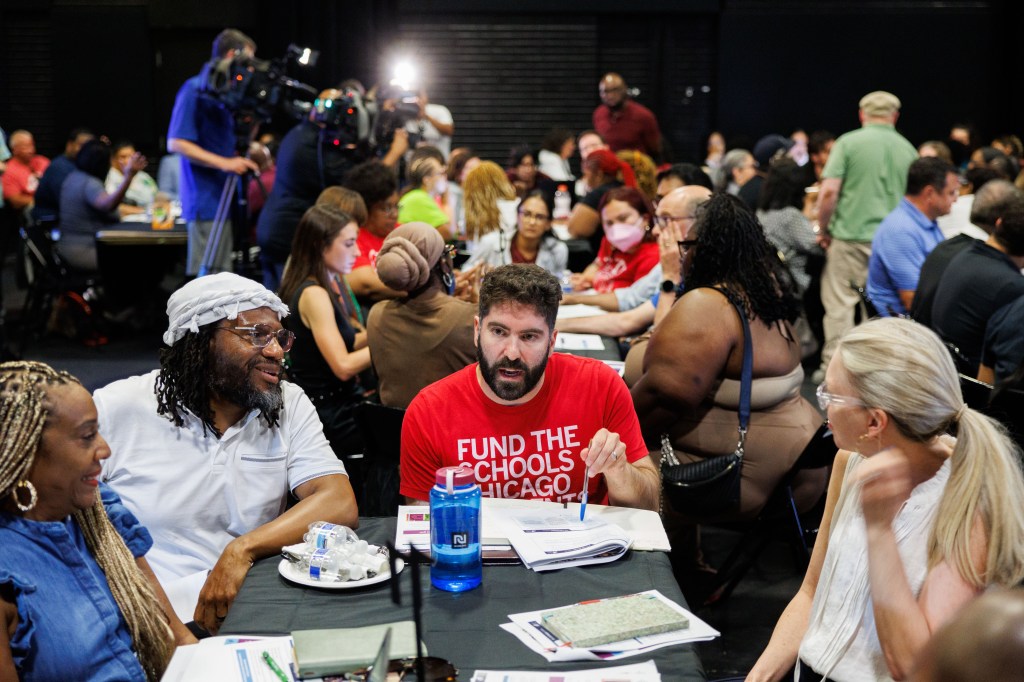This month marks yet another turning point in the checkered financial history of Chicago Public Schools. With a projected $734 million deficit, as estimated by the interim CEO, the Board of Education must pass a budget by the end of August. The decisions made in the coming days will determine whether CPS begins a path to fiscal stability — or plunges into a tailspin that will make recovery brutally painful.
Closing the gap was already a herculean task when it stood at $529 million, before the interim CEO added $175 million in the form of a pension reimbursement that City Hall has been attempting to strong-arm CPS into over the last year. Now, at $734 million, a solution is all but impossible without cuts to critical programs. The Municipal Employees’ Annuity and Benefit Fund of Chicago (MEABF) pension fund, created in 1921, covers both city workers and CPS non-teaching staff. Yet two-thirds of this cost belongs to the city, and the city controls the tax levy designated to cover this pension fund. The law clearly states that it is the city’s sole responsibility to fund MEABF, not CPS. The district did make partial reimbursements under an intergovernmental agreement during the COVID era, when it was flush with $3 billion in federal relief. That relief is now gone, but the mayor is insisting that CPS continue to pay.
Let’s be clear: There is no good way for CPS to pay this $175 million reimbursement. Revenue options are nearly nonexistent. Property taxes have already been raised to the legal limit, and CPS can raise money only through a referendum, which there is no time for. Even without the pension charge, CPS is being forced to make painful choices. Adding $175 million to the burden is like tossing a cinderblock to someone on the verge of drowning. It pushes any necessary cuts from difficult to catastrophic.
City Hall’s suggested solution for paying the pension reimbursement? CPS should just borrow the money. But a short-term, high-interest loan is a deeply risky move that simply kicks an even heavier can down the road. Borrowing to plug this year’s hole may feel like an easy fix, but it’s no fix at all. It would saddle CPS with increased interest payments and deepen the district’s future budget deficits, just as the district faces yet another financial cliff next year.
CPS is still paying nearly $200 million per year in interest on short-term borrowing from its last crisis, between 2016 and 2018. Those payments will last until 2048.
Had the district avoided borrowing then, this year’s deficit would be smaller. Repeating past mistakes now will only guarantee deeper harm to students and schools tomorrow.
Even in the short term, borrowing poses major risks. Using debt to cover operating costs would likely trigger a credit downgrade, dropping CPS even further into junk bond territory. That downgrade would raise borrowing costs across the board, deepening the deficit and limiting future options.
The consequences are real. First, higher interest rates would make CPS’ debt more expensive, worsening future budget gaps. Second, most CPS borrowing supports capital needs, especially building maintenance. If borrowing becomes more costly, even less will be done to fix the district’s $14 billion repair backlog. Third, CPS is banking on saving $100 million by refinancing existing debt at better rates. A downgrade risks erasing those savings and creating a new $100 million gap this year alone.
And while these numbers may feel abstract, the impacts are not. Rising borrowing costs divert dollars away from classrooms, counselors and student supports. The true cost isn’t just felt by taxpayers; it’s paid by children, who lose access to the education resources they deserve.
CPS is painting itself into a corner by attempting to cover the city’s MEABF pension bill. It all but guarantees the district’s only exit is through borrowing. But any loan is a dangerous gamble with the futures of hundreds of thousands of students.
Editorial: State control of Chicago Public Schools grows likelier as budget crisis intensifies
A loan now could trigger a spiral of rising deficits, interest payments and more borrowing, culminating in CPS being locked out of credit markets entirely. That’s exactly what happened in 1980, when the state had to step in and take over. That kind of crisis could undo the hard-won authority of Chicago’s newly elected school board before it even begins.
Importantly, when engaged, the public has been clear: Chicagoans overwhelmingly oppose CPS paying the city’s pension bill, and they oppose borrowing to cover the current gap with or without the pension expense.
The Board of Education should reject this shortsighted proposal. CPS exists to educate students, not to subsidize city pensions. Chicago’s children, families and taxpayers deserve better. They deserve a school budget that protects the classroom, preserves fiscal integrity, and puts kids first.
Daniel Anello is CEO of Kids First Chicago. Joe Ferguson is president of the Civic Federation.
Submit a letter, of no more than 400 words, to the editor here or email letters@chicagotribune.com.
